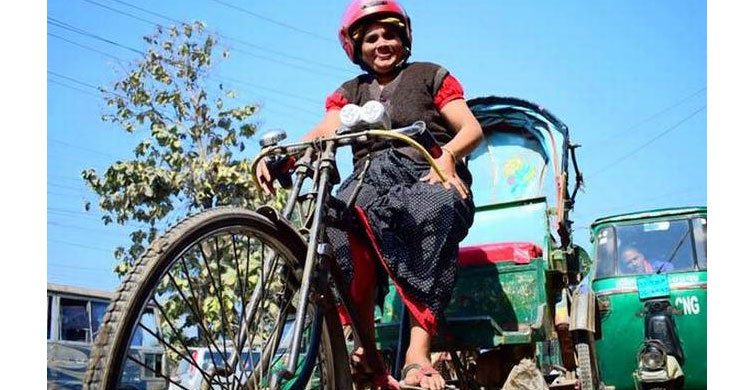Bangladesh’s only female rickshaw puller Jasmine!

Bangladesh’s only known woman rickshaw puller, Mosammat Jasmine, may be a feminist icon but to the passengers she cycles around the streets of Chittagong, she is known as “Crazy Auntie”.
“I do it to make sure my sons don’t go hungry and they get a decent education at a good school,” says the mother of three as she takes a break at Chittagong bus station. “Allah has given me a pair of hands and legs to work with. I don’t beg - instead I earn a living by using his gifts,” she adds.
Muslim-majority Bangladesh is one of Asia’s most conservative societies where the concept of a woman doing such a job had been unheard of before Jasmine hit the road five years ago.
Left to fend for three young children when her husband ran off with another woman, Jasmine initially tried her hand at being a maid and then working in one of Bangladesh’s garment factories but found
neither job suited her.
“A maid’s job is good if you only have to worry about yourself but not if you’ve got children. And the factory work is really back-breaking and the pay is really poor,” the 45-year-old explains.
Struggling to make ends meet and determined to pay for her children’s education, she decided on her radical career change when a neighbour who owned a rickshaw offered to lend it to her for a few days.
Working out how to navigate the streets of Bangladesh’s second city was the easy part although she did find it painful at times to peddle her brightly-coloured tricycle up some of its hilly neighbourhoods. But finding willing passengers proved a stiffer challenge.
“Initially, many simply refused to get on board and some taunted me, saying I was doing a man’s job,” she recalls.
“Others told me that Islam does not permit a woman to roam around like this while there were some who refused to pay me the same fare as a male driver,” Jasmine says, before adding: “I stuck to my guns as who else pays my bills, who is else is going to cover the cost of educating my sons?”
On average she earns 600 taka ($8) a day for an eight hour shift on the rickshaw, part of which she pays as rent to the rickshaw owner.
Now a familiar sight on the streets of the bustling port city, she has won the respect of her colleagues. As she parked up by the bus station, she exchanged smiles and greetings with around a dozen male drivers.


